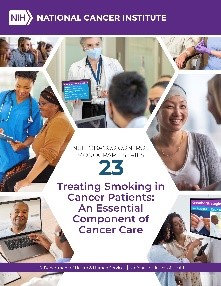
Smoking adversely impacts oncologic and other health-related outcomes among cancer patients, and individuals who smoke experience multiple benefits by quitting. This monograph synthesizes the evidence that smoking cessation treatment increases the quit rate for patients who smoke, identifies evidence-based interventions that have the potential to enhance the delivery of smoking cessation treatment in the cancer care setting, discusses special considerations for various populations who smoke, and identifies important research gaps related to these topics.
On This Page
Supplementary Materials
- Monograph Overview Fact Sheet (PDF, 311 KB)
- Fact Sheet for Public Health Practitioners (PDF, 453 KB)
- Presentation Slides (PDF, 4.2 MB)
- Infographics Card for Patients (PDF, 511 KB)
- Infographics Card for Clinicians (PDF, 507 KB)
- Infographics Poster for Patients – Printable 11 x 17 (PDF, 325 KB)
- Infographics Poster for Clinicians – Printable 11 x 17 (PDF, 550 KB)
- Social Media Promotional Toolkit (PDF, 519 KB)
Printed copies of the monograph Executive Summary are available upon request. Requests of up to 5 copies and fewer ship for free. To place your order, email ncidccpsbrpadvances@mail.nih.gov using the subject line “Tobacco Monograph print request”.
In your e-mail include:
- Name
- Organization’s name
- Shipping address
- Title(s) and requested quantities of each
- FedEx or UPS shipping number to cover shipping costs for more than 5 printed copies
Suggested Citation
U.S. National Cancer Institute. Treating Smoking in Cancer Patients: An Essential Component of Cancer Care. National Cancer Institute Tobacco Control Monograph 23. Bethesda, MD: U.S. Department of Health and Human Services, National Institutes of Health, National Cancer Institute; 2022.
Additional Resources
View the below resources for additional information on treating smoking in cancer patients.
View Individual Chapters
Chapters and key topics covered within each chapter are listed below. Chapters generally include an introduction, a chapter summary, and a reference list.
- Front matter (PDF, 783 KB)
- Foreword
- Table of Abbreviations
- Glossary
- Chapter 1. Introduction and Overview (PDF, 1.3 MB)
- Smoking Among Cancer Patients and Survivors
- The Consequences of Continued Smoking After a Cancer Diagnosis
- Addressing Smoking Cessation in Cancer Care Settings
- Purpose of the Monograph
- Preparation of the Monograph
- Key Terminology and Concepts
- The Multiple Phases of Smoking Cessation Treatment
- Major Conclusions
- Chapter 2. Smoking in Patients with Cancer: Biological Factors (PDF, 530 KB)
- Tobacco Smoke and Tumorigenesis
- Biological Characteristics of Lung Cancers in Smokers and Never-Smokers
- The Effects of Tobacco Smoke Exposure on Cancer Cells
- Chapter 3. Treating Tobacco Use and Dependence in Cancer Populations (PDF, 1.4 MB)
- Motivation to Quit
- Elements of Effective Smoking Cessation Treatments
- Special Considerations and Barriers Concerning Smoking Cessation Treatment in Cancer Care Settings
- Special Topics in the Treatment of Smoking in Patients With Cancer
- Addressing Motivation to Quit
- Relevance of Pharmacogenetic Intervention: Steps Toward Personalized Medicine
- Treatment Effectiveness and Access Across Different Populations
- The Use of Electronic Nicotine Delivery Systems (ENDS) in Patients With Cancer
- Chapter 4. Implementing Smoking Cessation Treatment Programs in Cancer Care Settings: Challenges, Strategies, Innovations, and Models of Care (PDF, 2.5 MB)
- The Importance of a Systematic Approach to Treating Tobacco Use in Cancer Care Settings
- Challenges to Implementing Smoking Cessation Treatment in Cancer Care Settings at the Patient, Clinician, and Health Care System Levels
- A Systems Approach to Providing Smoking Cessation Treatment Across the Cancer Care Continuum
- The Economic Rationale for Implementing Smoking Cessation Treatment in Cancer Care
- Disseminating and Implementing Tobacco Cessation Treatment in Cancer Care Settings: The National Cancer Institute’s Cancer Center Cessation Initiative (C3I)
- Appendix A: C3I Grantee Publications
- Appendix B: Biochemical Confirmation Reasons and Methods: Evidence Based on the Society for Research on Nicotine and Tobacco (SRNT) Working Group on Biochemical Verification
- Chapter 5. Addressing Smoking in Medically Underserved and Vulnerable Cancer Populations (PDF, 987 KB)
- Cancer Burden
- Smoking Cessation Treatment for Medically Underserved and Vulnerable Populations who smoke in the Clinical Cancer Care Context
- Smoking Among Socioeconomically Disadvantaged Populations With Cancer
- Smoking Among Racial and Ethnic Minority Populations With Cancer
- Smoking Among Rural Populations With Cancer
- Smoking Among SGM Populations with Cancer
- Smoking Among People With Co-Occurring Substance Use Disorders and Cancer
- Smoking Among Individuals With SMI and Cancer
- Effectiveness of Smoking Cessation Treatment
- Chapter 6. Monograph Conclusions and Future Research Directions (PDF, 435 KB)
- Major Conclusions
- Chapter Summaries and Conclusions
- Future Research Directions
- NCI Initiatives to Support Implementation of Smoking Cessation Treatment in Cancer Care and Screening Settings

